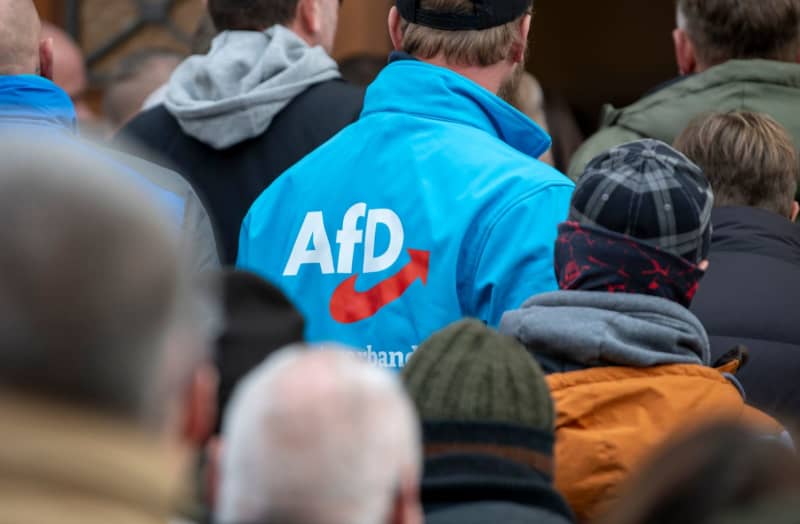Long seen as having a stronghold in eastern Germany, the far-right Alternative for Germany (AfD) is poised to make major gains in the west in Sunday’s parliamentary elections, party leaders say.
And a YouGov poll released on Thursday backs them up. The data showed that the AfD, which is classified by Germany’s domestic intelligence agency as a suspected far-right extremist group, looks set to even double the levels it reached in the west in the last national election.
In 2021, the far-right party polled between a low of 5% in Hamburg to a high of 10% in the small state of Saarland. For Sunday’s vote, YouGov sees a range of 12% in both Hamburg and Bremen to 21% in the south-western state of Baden-Württemberg, where just four years ago the AfD stood at 9.6%.
“We could crack the 10% mark,” said Robert Offermann, AfD spokesman in Hamburg. The party obtained 5.3% of the vote in the northern city state in 2021.
Party fuelled by immigration, economic fears
The rise of the AfD has many Germans worried – as seen by recent mass demonstrations against working with the party.
But party leaders say they are making gains because of their focus on illegal immigration, and following a string of deadly attacks from immigrants in Magdeburg, Aschaffenburg and Munich – although in at least two of the incidents the suspects were in the country legally.
Apart from security issues, Germany’s poor economy is also helping the far-right party.
“Five years ago it was mainly retirees, but now we have a lot of younger people,” Kurt Kleinschmidt, the AfD chairman in Germany’s most northern state of Schleswig-Holstein, told dpa.
“The economy is going down the drain,” he said. People “feel they have to do something,” he added, noting that AfD membership in Schleswig-Holstein rose from 743 in 2022 to 1,500 now.
Conrad Ziller, a political science professor at the University of Duisburg-Essen, says the often simple solutions offered by the AfD appeal to some people in these difficult times.
“People who are insecure and emotional are receptive to simple solutions,” he told dpa. The AfD’s anti-elite narrative is also appealing to people who feel they are being left behind, he says.
Number one in the east
That’s one reason why Ziller and others argue the party is so popular in the east, where the YouGov poll sees the AfD leading in all five states with vote shares ranging from 29% in Brandenburg to 37% in Saxony.
“The AfD is the east’s revenge on the west, which is blamed for all the upheavals after 1990,” retired sociology professor Detlev Claussen told Foreign Policy magazine last year following the AfD’s resounding success in east German state elections in Saxony and Thuringia.
He viewed the strong showing in the east as an outcome of “resentment against the West,” over the way in which unification between West and East Germany was conducted. For many east Germans, the merging of the two Germanies in 1990 was more like an expropriation than a reunification. It resulted in a major upheaval – not only of their economy but of social and private lives.
“In the east the AfD has successfully capitalized on the history of the former East Germany … even among young people who have no direct experience of the former East Germany,” Ziller said.
From anti-euro to anti-immigrant
The AfD formed in February 2013 – just seven months before national elections – and its raison d’etre at the time was the euro. The party’s founders were critical of the eurozone, a 20-member common currency group, especially since the European Union was in the middle of dealing with Greece’s debt crisis.
“In 2013, the AfD was therefore what some call a single-issue party,” said an analysis by the Munich-based ifo economics institute. The party failed, in that election, to achieve the 5% needed to enter parliament – but only by 0.3%.
After that, the AfD’s priorities expanded, though its “fiscal focus remained,” the institute said. In 2014 it won seven seats in the European Parliament.
The party’s central focus switched to an anti-immigration platform after Germany started to take in some 1 million immigrants in 2015, according to official figures. Fears, especially among working-class males, of being overrun by immigration, helped.
In the 2017 general elections, the AfD won 12.6% of the
vote and became the the third biggest party in parliament. While it did very well in eastern Germany, it outperformed the national average in several western German districts, ifo noted.
“The AfD’s heartland is eastern Germany,” ifo wrote, but “the AfD is not only a phenomenon of the east.”
What a difference an election can make
Although the party made good gains in 2017, by the time 2021 rolled around, the coronavirus and not immigration was the main focus, with the AfD campaigning on an anti-vaccine position.
“That’s one of the reasons why we lost ground,” Robin Classen, spokesman for the party in the western state of Rhineland-Palatinate told dpa.
But for this election – a combination of anti-immigrant sentiment, the recent attacks, a poor economy and anti-establishment attitudes is expected to more than reverse the losses seen last time around.
This does not mean that the AfD will join the government anytime soon. With the mainstream parties – including the conservatives who are expected to win the election – all having ruled out working with the far right, the party is set to become the biggest opposition bloc.
But, as the AfD looks set to achieve the best result for a far-right party in Germany’s post-Nazi era history, it has already firmly set its eyes on 2029.
Read the full article here
